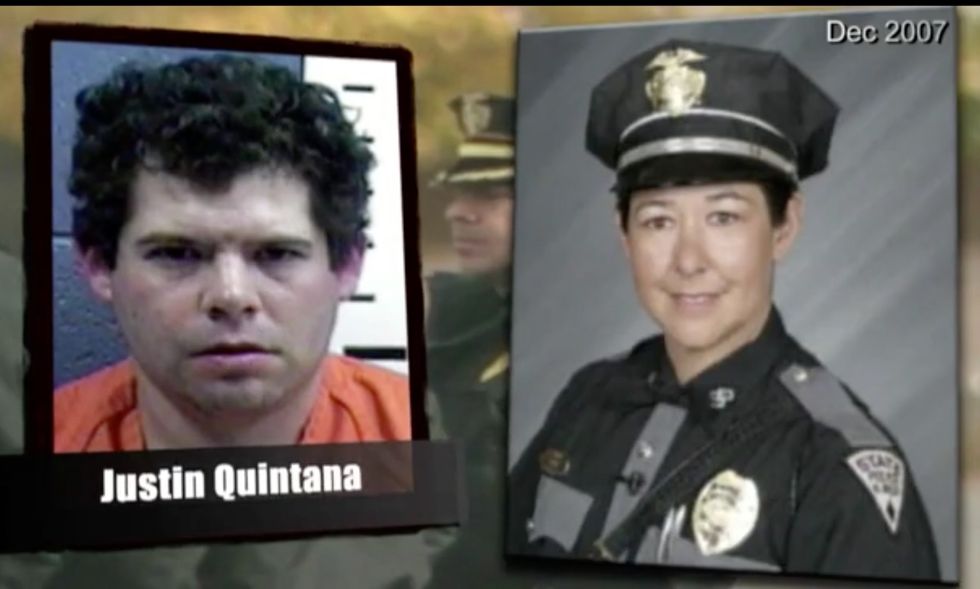A New Mexico man who authorities say murdered his police officer mother in 2007 may soon go free because of a state law regarding defendants found 'not guilty by reason of insanity.'
Prosecutors and family are working to keep Justin Quintana, 35, who has been diagnosed with schizophrenia, locked up at the Behavioral Health Institute in Las Vegas, New Mexico, where a federal judge committed him last year, KRQE-TV reported.
What's the story?
Quintana allegedly broke into his mother's house in 2007 and stole her service weapon, Blue Lives Matter reported. Later, he called his mother, Susan Kuchma, a five-year veteran of the state police department, to his home where he brandished the stolen firearm.
Kuchma, who was off-duty at the time, left, but Quintana followed her and fatally shot her in the head, police said.
Quintana called 911 but reportedly told police the shooting was an accident.
At the time of the incident, a judge ruled Quintana incompetent to stand trial. For nearly a decade, he stayed in the state mental health facility.
In 2017, two physicians finally found Quintana competent enough to stand trial for his mother's murder, although one of the doctors called him "extremely dangerous."
Quintana's attorney and prosecutors reached an agreement before the case went to trial. They believed the deal would keep Quintana, who has allegedly admitted to the murder, locked up in a behavioral health facility.
District Court Judge Douglas Driggers in August declared Quintana not guilty by reason of insanity and ordered him back to the mental hospital where he would stay until he is deemed sane or no longer dangerous.
What's the problem?
Under New Mexico law, for a person to be involuntarily committed more than 30 days, there must be sufficient evidence proving they are at risk of serious harm or that commitment is the least drastic way for them to receive treatment, according to the Santa Fe New Mexican.
Also, a criminal suspect can be committed to treatment until they are declared mentally competent for trial.
But since Quintana was deemed competent to stand trial and then found not guilty by reason of insanity, he no longer qualifies for involuntary commitment, according to the New Mexico Department of Health.
The Department of Health, which runs the Behavioral Health Institute, argues that the order violates the "processes designed to protect patients’ constitutional rights and creates a whole new way of committing a person to New Mexico’s mental hospital," the Santa Fe New Mexican reported.
Did they go back to court?
The state filed a petition asking for a stay on Driggers' order.
Last week, the state Supreme Court heard the petition, according to KRQE.
A lawyer for the department, Erin McSherry, told the Supreme Court during a hearing on Jan. 8, that Quintana does not qualify for the commitment that the judge ordered, but that prosecutors could pursue civil commitment.
The Santa Fe New Mexican reported that McSherry also told the court that keeping Quintana is a drain on resources at an institution that has operated at capacity in the past.
“I don’t think the proposal of anyone is to throw someone on the street,” McSherry said, adding that the institute is seeking a plan that could include care in the community when he's released.
Quintana's attorney, family members, and prosecutors fear if he's released he would end up on the streets and be a danger to himself and others.
A five-member court sided with the department on the case, meaning that Quintana could soon be set free, according to the Santa Fe New Mexican. The court ordered the hospital to hold Quintana 15 more days, allowing prosecutors time to pursue a civil commitment.
What's next?
Deputy Third Judicial District Attorney Davis Ruark said they would seek a civil commitment but that it's up to state lawmakers to close a hole that leaves few options for cases involving the mentally ill.
“Forty-nine other states have provisions within their code that deals specifically with somebody who is insane when they commit the offense,” Ruark told KRQE. “There’s 49 other states that specifically allow for commitment to a mental health facility until the very least sane, but more importantly, he’s no longer a danger to the community or himself.”
Why does this matter?
The case questions whether a court has the authority to commit a person indefinitely or allow the release of someone without the advice of a doctor.



